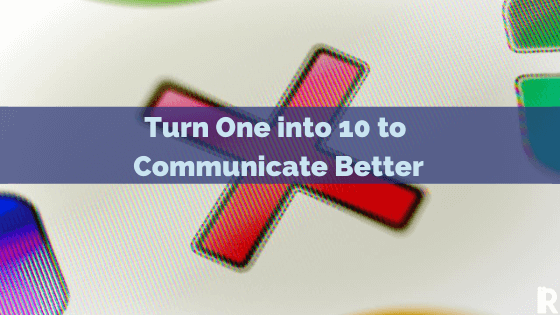With the demand to produce so much content, think about repurposing the hard work you’ve already done to better reach your customers.
10x is a common term that seems to have a few different definitions. Rand Fishkin from Moz coined the term “10x content” in relation to “content that is 10 times better than the best result that can currently be found in the search results for a given keyword phrase or topic.” There’s also Grant Cardone’s book ” The 10x Rule” about increasing your efforts and time by a multiple of 10 to reach your goals.
But the definition I want to talk about is in the idea of repurposing content 10x. Or at least understanding the potential for it.
Continued Demand for Content
We have a finite amount of resources: time, people power, skill sets, etc. so when we do create content, there’s a lot of work that goes into it. Usually a lot more than others realize. Video, graphics, podcasting, blogs, news releases… all don’t just drop out of the sky. There’s strategy, time, effort, patience, navigating challenges and so much more.
And the demand for more and more content to engage with your audience continues. Whether it’s for web sites, printed materials or the various multimedia and social media platforms you operate to engage with your customers, or the internal channels of communication to connect with employees, the need to create just never seems to diminish.
So it’s important to look at every piece of content you create, as content that can be repurposed as other pieces of content, allowing you to do more with less and give the information a longer life.
To get an idea, let’s look at one of the easiest forms of content to repurpose: VIDEO. Now keep in mind, not all new pieces of content are needed or possible. This is just to demonstrate what could be done.
As an example, let’s consider this video the BC Ministry of Transportation and Infrastructure did explaining how the Lions Gate Bridge Counterflow works:

The video itself does a great job of breaking down how the centre lane on the bridge works, based on monitoring dynamic traffic flow during peak and non-peak times. It’s a nice, short educational piece of content created to answer a common question from the public.
Repurposing 10x
To give this story a longer and varied life, this video can be transformed into far more pieces of content with much less additional effort. The heavy lifting is done, now look at different ways to share this information.
For example:
- Podcast – if you have an established podcast or some variety of audio content (Soundcloud?), rip the entire voiceover as a sound file. Add a bit of production value to it and host as either a podcast or in a shareable audio format.
- Blog Post – transcribe the entire video or take the existing script and reformat the text into a more conversational blog post with sub-headings.
- List-acle – pull the best takeaways from the video and create a list article of the “top 7 things you need to know about the Lions Gate Bridge counterflow.”
- Quotes – capture some of the more interesting quotes from the video and make them into graphics or use them to accentuate other content like a blog.
- Fun Fact – take some of the “fun facts” and create a variety of social media posts, such as “Did you know: traffic control operators monitor more than 40 cameras on the Lions Gate Bridge and surrounding highways to keep you moving.”
- Infographic – retell the narrative of the daily counterflow through a long form visual. This video already has some great visuals you can use for inspiration.
- Soundbyte – take a 10-15s audio clip from the video that is either interesting or explains something.
- Teaser Trailer – edit some of the more captivating parts of the video into a condensed version to promote the longer form video. Think movie trailers.
- Trivia – Ask questions with answers within the video to engage your audience. For example, “How often are traffic control operators monitoring the bridge?”
- Web Content – use the information from the video to add value and further clarity to existing websites. For example, condensing the content into bullets to add to this website Lions Gate Counterflow (and of course, include the video itself)
Your audience, whether customers or employees, consume content differently. What will resonate for one, won’t for another, so it’s important to look at different ways to tell the same story.
As I mentioned, not all content can be repurposed in these specific ways, but consider other options beyond this list.
Benefits to Repurposing
Repurposing has its benefits, with a few being:
- Resonates with your audience in personal ways – everybody learns and receives information differently. By changing up your content, you’re offering more access to the information. And keep in mind, this content is not only for your customers. It could also be used to educate for onboarding employees or or to breakdown organizational silos.
- Brings old content back to life – stale content can have new life in a new form and feel fresh again. Older content repackaged can get attention if it still provides value (and is promoted with great search engine optimization).
- Maximizes your time and effort – you put a lot of effort into this ONE big piece of content, so creating new content off an existing idea and approach, takes less resources.
- Increases your online presence – more content allows for better search results and reinforces your brand as a subject resource.
Far too often, we put so much effort in to a “one and done” piece of content and then move onto the next thing. By looking at the video/graphic/blog/podcast from different angles and considering the many different audiences it may have and the different problems it could fix, it will give your content new and longer life.
What other ways could repurposing content be effective?






